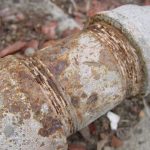A garbage disposal can be a real asset in a busy home, but many homeowners don’t take good care of their unit, and eventually, this will catch up with them. When a garbage disposal unit is neglected, it’s prone to failure, and this can lead to an expensive repair later. But, if you adopt a proactive approach, with proper cleaning and a regular maintenance routine, you can prevent many repair problems and even extend the lifespan significantly.
Dealing with a Smelly Garbage Disposal Unit
When your garbage disposal is operating properly, it should have a neutral odor. If you can detect bad smells emanating from the unit, it’s likely that you have a mold problem. When the food particles are too large for the garbage disposal to handle efficiently, they can become clogged in three main locations. The first spot is the area under the grater, the second location is around the sides of the unit, and the final spot is the drain pipe. When food particles become trapped, they start to decay, and with the darkness and warmth, this provides an ideal environment for the growth of bacteria and mold. This will get progressively worse, leading to truly awful odors and the release of unhealthy mold spores into the air.
This situation can be remedied if you get into the habit of cleaning your garbage disposal unit every week on the same day. When you adopt the proper cleaning methods that we will detail below, you will have a clean and odor free unit.
Cleaning the Garbage Disposal Unit Properly
Firstly, it’s important to state that we don’t recommend store bought chemical drain cleaning products. These contain hard caustic chemicals that can damage your skin as you’re cleaning, and they are not good for your unit. When you pour caustic chemicals into your pipes, they cause a reaction that can weaken and corrode them. There is no need to use these products, they are more expensive than our cleaning solutions, and they can lead to an expensive repair bill.
The ideal cleaning solution for your garbage disposal unit is non-hazardous, and you may have many of the ingredients in your store cupboard already. If you look online for homemade cleaning recipes, you will soon notice that vinegar and baking soda are well represented. This is because these two ingredients are very effective when combined together, they deliver plenty of cleaning power, and they can kill bacteria.
A good mixture for your garbage disposal is a ½ cup of baking soda that you pour in the drain, followed by a ½ cup of vinegar. This mixture should start to fizz, and you need to leave it for around 15 minutes to let it work its magic. If you want to keep the mixture firmly in the drain, you can use the sink stopper to seal the drain. When the 15 minutes is up, simply wash the remaining mixture away by running some hot water into the unit for at least 1 minute. After this cleaning process, the garbage disposal unit should be clean and free from bacteria and mold.
Adding Citrus Peel
Some people add citrus peels to the garbage disposal to give them a fresh odor that can nullify any foul odors. We don’t recommend this method because the peel can get trapped like food and contribute to the problem when it decays. If you like the smell of citrus from your disposal unit, it’s a better idea to add a little citrus oil or an essential oil during the cleaning process.
Using Ice Combined with Rock Salt
This method can eliminate odors, but you will need to use power and run your garbage disposal as you clean. To start, shut-off the power, pour around a dozen ice cubes into the drain, and add a cup of rock salt for good measure. Then you can restore the power, turn the garbage disposal on and run the unit for a minute. At this point, the rock salt and ice should have scraped away any stubborn debris, and the unit should smell fresh. We prefer using the baking soda and vinegar method detailed above, but this is a good alternative if you have stubborn debris and you want to try an alternative approach.
Prevention is Better Than the Cure
The best way to keep your garbage disposal unit in great shape is to closely monitor what goes in it. Some food materials and debris cannot pass through a disposal easily, and these are more likely to cause a clog and bacterial growth. Some food debris can even damage the unit blades leading to a repair bill or a replacement in extreme cases. Let’s take a look at some materials that should go in the trash instead. They are animal bones, fats, cooking oils, grease, eggshells, coffee grounds, rice, bread, paper, plastic, celery, and other tougher vegetable skins. In a busy home, it can be hard to keep track of what other people are doing. It’s a good idea to make everyone aware of what they can and cannot place in the garbage disposal to avoid confusion. Consider making a cheat sheet, get it laminated, and place it near the garbage disposal unit for easy reference.
4 Quick Tips for Better Cleaning
- Clean Regularly: Don’t wait for the unit to start smelling foul before you clean it. Regular cleaning will help to prevent the build-up of food debris that can cause these types of problems.
- Shut-off the Power: Before you attempt any garbage disposal unit cleaning detailed here, it’s important to shut-off the power first. You can simply unplug the unit from the power outlet located under the sink. If you can’t find that outlet, you must cut the power at the circuit breaker that supplies power to the garbage disposal.
- Use an Auger: If you can’t seem to shift a stubborn clog, you can break it up with a plumbing augur (snake). Under no circumstance should you place your hands down the drain.
- Routine Flushing: You can flush your garbage disposal regularly with hot water for at least 1 minute. Another quick flushing method is dropping a dozen ice cubes into the drain and running the unit for 1 minute. Both of these flushing methods can really help you to deal with an odor buildup quickly.
If you can’t seem to get your garbage disposal unit clean or you need some essential maintenance, contact your local plumber today.





